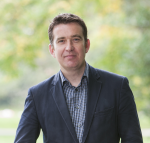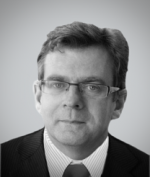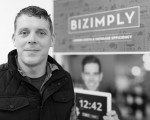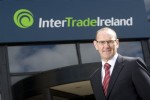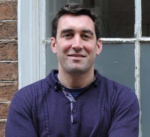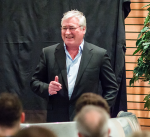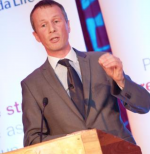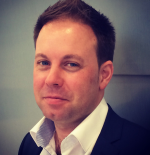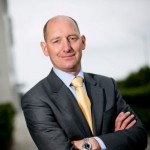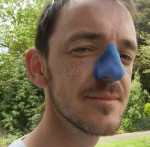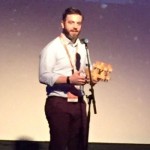Introduction
Get Digital, the last DICE conference took place on Tuesday 12 2016. It was shorter than the previous ones as we had the presentation of the Posters before. The topic today was cloud computing. 5 different speakers talked about their experiences within this area.
Speaker 1: Paul Dwyer
 Our first speaker, Paul Dwyer worked with the US secret service and companies like the FBI. Moreover, he wrote a book about cyber security and cyber risk.
Our first speaker, Paul Dwyer worked with the US secret service and companies like the FBI. Moreover, he wrote a book about cyber security and cyber risk.
“The cyber world and the physical world are integrated.”
This citation lead us through his speech. However, there are some significant differences between the two. Mr. Dwyer explained this with a simple example. A criminal in the real world needs access to assets that he wants to steal. A criminal in the cyber world can copy things from the other end of the world and we maybe would not recognize this.
According to Mr. Dwyer it is way easier to become a criminal in the cyber world than in the real world. One cause for this is the growth of the Internet. The workers behind this scene do not have any morals at all. Examples like the JP Morgan company show, that without the real world the cyber world cannot exist.
When looking at the web we have to differentiate between two different types. The surface web and the deep web. The surface web is 10%, the deep web even 90% of all the contents online. US Navy analysts, Dwyer calls them “spies” found that out.
The deep web contains websites with for example prices for crime. I was really shocked when I saw the table, differed into murder, rape, beating and many more and the prices what they cost. Paul explained that the people behind those sites are businessmen who also know how to target their group. In the deep web it only takes one click until you will be arrested whereas in the surface web you need at least 3 clicks.
It can be said that the cloud contains lots of opportunities but also many challenges. Those challenges are not of a technical nature as many think, but of the legal one. One of the opportunities in Ireland is the fact that the top five companies in cloud computing are headquartered here. The problem is that the “bad guys” collaborate and share their knowledge. Nevertheless, Europe started building a community to defeat this.
Speaker 2: Brendan Murray
 Brendan Murray is DCU Alumni and talked us through the revolution of Cognitive Cloud.
Brendan Murray is DCU Alumni and talked us through the revolution of Cognitive Cloud.
There are three main points in this revolution:
- Cost
- Innovation
- Business value
It all started with Cost what describes the simple infrastructure of cloud computing. It was developed to mobile or web apps until where we are now, the business perspective. According to Murray we are at the very beginning of this step and the clever analytics.
The Internet of Things, which was his main topic is one of the most exciting and dynamic areas of IT. It links physical entities with IT systems. Whenever we are in the Internet we leave little tracks that can be traced back. Data is the whole point of the Internet of Things. Finally, the analytics part is to extract the insights or rather the patterns of e.g. the consumers.
Today there are about 13 billion connected devices. This number is expected to double in the next 5 years. In the next 10 years the economic value of it will be 11 trillion dollar. Soon it will be the largest single source of data on the planet. However, over 90% of it will be unused.
Cognitive Systems on the other hand are fundamentally different. They understand. This means that they adapt and make sense of data. Moreover, they reason. They interpret information and come up with a conclusion. And finally, they learn what means that they accumulate data and derive insight at every interaction.
Cognitive technologies are for example: vision, machine learning, language processing, planning & scheduling or speech recognition.
With cognitive technologies you create an intelligence that learns from the real world. They can present unbiased hypothesis.
Speaker 3: Ryan Ball
 “Content Context Marketing: The art of not sucking” This was the title of the speech of Ryan Ball. It immediately made me curious about what will come now. Ball is the Head of enterprise sales. His speech was one of the most interesting ones, as he had a real good style of presenting and catching our attention. Probably this was because he first of all wanted to get us up and have a little stretch.
“Content Context Marketing: The art of not sucking” This was the title of the speech of Ryan Ball. It immediately made me curious about what will come now. Ball is the Head of enterprise sales. His speech was one of the most interesting ones, as he had a real good style of presenting and catching our attention. Probably this was because he first of all wanted to get us up and have a little stretch.
Ball started with a little review of how marketing was in former times. In the case of Nike for example it was all about social positioning and peer pressure. Nike had a paper with statements that made people think about their actual state and what they might want. What was really interesting was that with such a campaign Nike invented the word “jogging” which is now used all over the world.
Marketers are the ones responsible for growth.
However, 60% of the sales cycle is over before a buyer has contact with a salesperson. It is all about recommendations in the Internet or of friends.
We have to differentiate between inbound and outbound marketing. Outbound marketing is about interruption and is thus seller-centered. Inbound marketing is more about attention and is buyer-centered. The inbound sector grew a lot in the past years as traditional marketing is broken. 86% skip TV ads. 94% unsubscribe from Email. 44% of direct mails is never opened. These numbers show very well that there was a change and that it is important to adapt. Ads are a great way to build audience but when the money is away this will stop.
Therefore, Ball’s company, a cloud company, uses a new set of tactics such as free tools. The website websitegrader.com took them 8 weeks to develop and is a tool that can be used without paying. This is how you keep customers. Another technique would be to build contests. We don’t want to be part of a big crowd, we prefer being individual. Therefore, we expect websites to be in a constant change. An example for this would be the speech of the pope in 2005 compared to the one in 2013 where way more people had a smartphone.
Speaker 4: Carl Dempsey
 Dempsey’s speech was about the IT and their exercises. Customers expect software to be easy and not to change very often. On the other side there are the business people who want changes so that the revenue rises. IT workers are on the constant struggle to develop new tools and to satisfy consumer expectations. I found quite interesting that 85% of time and money is used just to keep the software on track. Only 15% can be used to develop it!
Dempsey’s speech was about the IT and their exercises. Customers expect software to be easy and not to change very often. On the other side there are the business people who want changes so that the revenue rises. IT workers are on the constant struggle to develop new tools and to satisfy consumer expectations. I found quite interesting that 85% of time and money is used just to keep the software on track. Only 15% can be used to develop it!
According to Mr. Dempsey we are living in the Age of the Customer. Customers are nowadays also able to get information. The example he gave us for this was a bank. Customers are able now to research everything in the Internet and to even have access to the information in the bank during the discussion with the personnel. This is a total change to what such a situation was some years ago.
One of the customer’s needs is consistency marketing. It is important to recognize things as we have so many choices today. The problem for businesses is to keep the customers as they can simply switch to the competitor if they have a better offer for the thing customers are looking for.
Speaker 5: Fergus Gloster
 Mr. Gloster is non-executive director. His speech was about SaaS. These four letters stand for software as a service. It was a bit sad that he didn’t explain that word, as it was then really hard to follow his speech.
Mr. Gloster is non-executive director. His speech was about SaaS. These four letters stand for software as a service. It was a bit sad that he didn’t explain that word, as it was then really hard to follow his speech.
SaaS is the new business model. Cloud computing allows us to create an app for example, and it is immediately available all over the world. We apparently moved from a product to a service. This also includes the fact that the power switched from the vendor to the buyer. As Mr. Dempsey mentioned before, the customers have the choice and also the possibility to easily switch if they like. This makes it harder for companies to keep them. The whole thing lead to a shift in the distribution model. We have to think about the role of resellers in the process.
Marketing will change in the future. What the others mentioned before was also the key in Gloster’s speech. Most B2B solutions need to be changed. In former times companies did what all the others did as well. However, now the key is to differentiate from the others and deliver devices or rather services that are distinct. Nevertheless, this will not happen without an effort. Companies have to specialize in one thing and probably decide to only serve one segment.
Conclusion
The last conference is over now, and we got a full picture of all the opportunities and challenges in cloud computing. This conference was related to the one which dealt with online marketing and again demonstrated the changes that happen now in that area. People become more connected and use more online devices.
I’d like to thank all the guest speakers of all conferences and the module’s organizing team that made it possible to listen to so many different speeches and get to know companies and their views much better!
All the best,
Dicedcu9968







